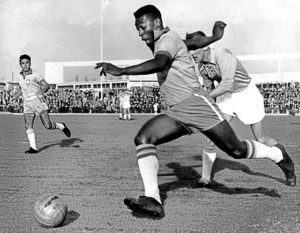
Pelé dribbling past a defender during Malmö-Brazil 1-7 (Pelé scored 2 goals) at Malmö city stadium. AFP/SCANPIX, Public domain, via Wikimedia Commons
Soccer star Edson Arantes do Nascimento — known around the world as Pelé — has died at 82. It has been reported that Pelé has been battling complications from colon cancer. He was admitted into a hospital in São Paulo last month.
Pelé was soccer’s global face for decades. Many regarded him as its best player of all time. He rose from humble beginnings in rural Brazil to eternalize a powerful and creative style of play.
From the Dispatch:
Pelé—the footballer so transcendent his name is synonymous with the sport—died yesterday at age 82. “According to him, his most personal aim was to achieve the unrealized greatness he glimpsed in his father, who’d been an admirable but obscure player, to redeem him from a failed soccer career,” José Miguel Wisnik writes, reflecting on the beauty of Pelé’s play and life. “Before he knew it, he was the top idol of the most popular sport on the planet, making his thunderous arrival at the 1958 World Cup, at the age of 17.” But his career also tracked with the increasing commercialization and systemization of his sport, Jonathan Wilson argues for Unherd. “Nobody should criticize somebody who grew up in the poverty Pelé did for pursuing every opportunity they can,” Wilson writes of his many sponsorships. “But that doesn’t mean that there cannot be sadness for what he became and what football has become. Amid the dictatorships, there was something beautiful about 1970. The feelings of wonder Brazil and Pelé evoked at the time were not fake, nor should they be invalidated by context: art can flourish in the most brutal of places.”





